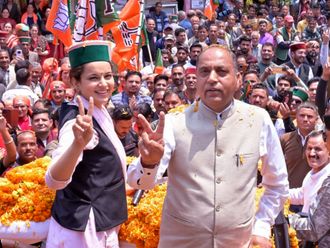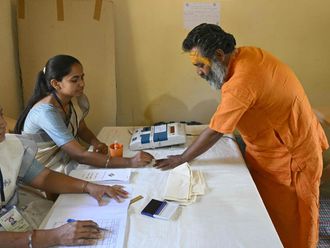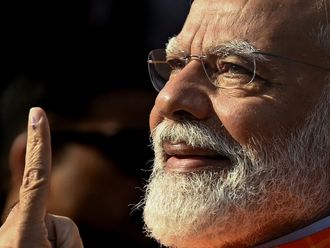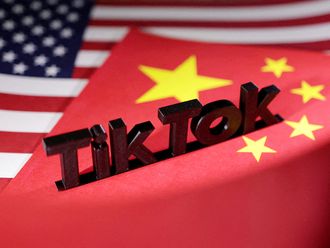Global investors, the mainstay of India’s bullish stocks, have begun to unwind their positions in the wake of rising tensions in the Middle East and Ukraine, taking some sheen off one of the world’s top performing markets this year. However, the longer term outlook remains a good bet for strong returns.
Overseas funds have pulled out more than $1 billion (Dh3.67 billion) from India’s financial markets — over $320 million from stocks and $600 million from debt securities — in early August as risk appetite soured on worries an escalation in the internecine turmoil in Iraq could trigger a spike in crude oil prices and hurt economies such as India that depend on imports for much of its energy requirement.
Investor sentiment has also been dampened as market pundits interpreted the Reserve Bank of India’s comments as “hawkish”, which poured cold water on expectations for an easing and instead raised the probability for a rate hike later in the year.
As expected the central bank kept interest rates unchanged on Tuesday, but flagged concerns of potential price pressure points referring to uncertainty over monsoon conditions and their impact on food production, possibly higher oil prices stemming from geopolitical concerns and exchange rate movement, and strengthening growth in the face of continuing supply constraints.
“The balance of risks around the medium-term inflation path, and especially the target of 6 per cent by January 2016, are still to the upside, warranting a heightened state of policy preparedness to contain these risks if they materialise,” the RBI said.
It also said that the upside risks to the target of ensuring consumer price inflation at or below 8 per cent by January 2015 remain, although overall risks were more balanced than in June.
“The tone of the policy on the margin appears to be a bit hawkish,” investment bank JP Morgan said. “We believe the change in tone could partially be attributed to better anchor market expectations.”
In a way the RBI wanted to correct a market perception the bank’s June policy statement was “dovish”, which sparked talk for a rate cut among some players.
Risk appetite
Going further the central bank pointed out that dependence on robust foreign portfolio inflows, responsible for Indian shares more than 20 per cent jump this year, had also some pitfalls. “Emerging market economies remain vulnerable to changes in investor risk appetite driven by any reassessment of the future path of US monetary policy or possible escalation of geopolitical tensions.”
The top-30 Sensex and the broader 50-share Nifty shed more than 1 per cent each on Friday, and posted a second consecutive week of losses, largely in response to foreign fund selling.
“The biggest concern in the very near term is the risk of geopolitical tensions,” S. Naganath, chief investment officer of DSP BlackRock Investment Managers who oversees about $7.6 billion, told Bloomberg. “We won’t be surprised if we see a 10 per cent correction. That correction ought to be used to buy.”
The Sensex may then rally 25 per cent by next April as India’s accelerating economy lures back investors, he said.
Silver lining
State Bank of India, the country’s largest commercial lender, reported its April-June net profit rose for the first time in six quarters as credit growth picked up and sticky loans dropped, signalling a turnaround on the back of an improving economy.
Net profit climbed 3.3 per cent from a year earlier to Rs33.5 billion rupees in the latest quarter, beating market estimates, while interest earned jumped 15 per cent to Rs364.87 billion. Gross bad-loan ratio fell to 4.9 per cent from 5.56 per cent a year ago. That is still well above the average for the banking sector, which is around 4 per cent.
Tata Motors, which releases results on Monday, is expected to announce its quarterly earnings more than doubled on strong show by its UK-based Jaguar and Land Rover unit and improving commercial vehicle market in India.
Investors should also look beyond the large-cap companies to ensure better returns. In this regard, BNP Paribas has picked three Indian small-cap companies among its 39 “Asian emerging jewels”, after a close scrutiny of parameters such as strong growth, safe balance sheet, high capital efficiency and reasonable valuation.
“It’s usually in a bull market that the high tide of liquidity causes all boats to float, and investors flock to small caps to take advantage of their relatively cheaper valuations,” analysts Manishi Raychaudhuri, Gautam Mehta and Rajan Jain said in a report.
The three small companies recommended by the French investment bank are lender Karnataka Bank, multiplex movie theatre owner and operator PVR Ltd and Gujarat-based energy explorer and oil and gas producer Selan Exploration Technology.
Although Greaves Cotton, Speciality Restaurants and JK Lakshmi Cement were not included because of the high criteria set for the selection, it said that “our interactions suggest have significant investor interest” in these stocks.
Earnings, data
Besides the heightened tensions in the Middle-East, on the radar in the coming week will be inflation data — July consumer price index on Tuesday and wholesale price index on Thursday. Because of an increase in vegetable prices, the CPI is expected to come in around 8 per cent, which could build the case for monetary tightening.
“Despite the improvement in the monsoons, vegetable prices continue to surge. They increased 44 per cent [sequentially] in July and have already increased 25 per cent sequentially in just the first five days of August,” JP Morgan analysts Sajjid Chinoy and Toshi Jain said in a report.
“Also, high frequency data reveal that cereal prices have also hardened by 2 per cent in July. Consequently, we expect July CPI inflation to re-accelerate to about 8 per cent and, if the early food trends for August were to sustain, August CPI would also stay above 8 per cent. All told, therefore, we hold on to our rate hike call for the end of this year and wait and watch the progress of the monsoon and the out-turn of food prices in the coming weeks.”
Industrial output for June, due on Tuesday, should further reaffirm a rebound in the manufacturing sector although companies are still unable to raise prices fully in tune with higher raw material costs. Notably, the spike in food prices are taking away a big chunk of the discretionary spending power of consumers — a factor that is making manufacturing firms to live with narrower margins.
Quarterly earnings this week include Jet Airways, which is part-owned by UAE’s Etihad Airways, Jaiprakash Associates, GVK Power and Infrastructure and GMR Infrastructure.
The writer is a journalist based in India












